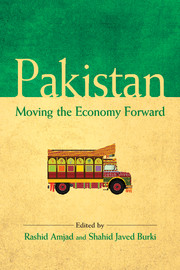Book contents
- Frontmatter
- Contents
- List of figures and tables
- Preface
- 1 Overview
- 2 Failed Economic Promise: Lessons from Pakistan's Development Experience
- 3 Economic Management Under IMF Tutelage: Key Lessons from the Musharraf and PPP Rule 1999–2013
- 4 A Country and an Economy in Transition
- 5 Tackling the Energy Crisis
- 6 Exports: Lessons from the Past and the Way Forward
- 7 The Future Path of Tax Reforms in Pakistan
- 8 Pakistan's Indus Basin Water Strategy: Past, Present and Future
- 9 Economic Governance and Institutional Reforms
- 10 Benefiting from Foreign Direct Investment
- 11 An Analysis of the Remittances Market in Pakistan
- 12 The Prospects for Indo-Pakistan Trade
- 13 Beyond the Poverty Line: A Multidimensional Analysis of Poverty in Pakistan
- 14 Can the New Intergovernmental Structure Work in Pakistan? Learning from China
- Contributors
- Index
2 - Failed Economic Promise: Lessons from Pakistan's Development Experience
Published online by Cambridge University Press: 05 May 2015
- Frontmatter
- Contents
- List of figures and tables
- Preface
- 1 Overview
- 2 Failed Economic Promise: Lessons from Pakistan's Development Experience
- 3 Economic Management Under IMF Tutelage: Key Lessons from the Musharraf and PPP Rule 1999–2013
- 4 A Country and an Economy in Transition
- 5 Tackling the Energy Crisis
- 6 Exports: Lessons from the Past and the Way Forward
- 7 The Future Path of Tax Reforms in Pakistan
- 8 Pakistan's Indus Basin Water Strategy: Past, Present and Future
- 9 Economic Governance and Institutional Reforms
- 10 Benefiting from Foreign Direct Investment
- 11 An Analysis of the Remittances Market in Pakistan
- 12 The Prospects for Indo-Pakistan Trade
- 13 Beyond the Poverty Line: A Multidimensional Analysis of Poverty in Pakistan
- 14 Can the New Intergovernmental Structure Work in Pakistan? Learning from China
- Contributors
- Index
Summary
Introduction
Pakistan has had a checkered economic and political history. The country's periods of rapid growth in the 1960s, the first half of the 1980s, and 2002–07, have been followed by periods of sharp economic slowdowns. Sustained economic growth has been elusive; there has been no real deepening of the structure of the economy, and social and distribution issues have become increasingly troublesome. Yet Pakistan has somehow managed to attain an annual average gross domestic product (GDP) growth rate of 5.2 per cent and a per capita income growth rate of 2.5 per cent over the last half century (1960–2010) that has more than trebled the average living standard over the period.
The distribution of gains from growth has, undoubtedly, not been equitable. However, the country's economic record, though of course not able to match that of East Asia—especially China, and more recently India—seems to compare favorably with the average for developing countries. This is no mean achievement considering the great deal of political instability and long periods of military rule that entailed relatively good governance but a high cost in terms of defense spending, continued tension with India, and weakening institutional authority.
However, Pakistan's past economic performance is also somewhat misleading because the growth of output, investment, and employment have very seriously slowed down after 2008 and the prospect of strong economic revival has become uncertain (Institute of Public Policy, 2012, Chapter 2). GDP growth averaged less than 3 per cent per annum over 2008–12. Gross fixed capital formation dropped more than 30 per cent in real terms over 2008–12 and the ratio of fixed investment to GDP at around 11 per cent in the financial year (FY) 2012 was at its lowest level in half a century. Public finances have deteriorated very significantly and external finances are being kept afloat largely as a result of substantial workers' remittances, both through official channels and money market companies.
- Type
- Chapter
- Information
- PakistanMoving the Economy Forward, pp. 22 - 47Publisher: Cambridge University PressPrint publication year: 2015
- 2
- Cited by



